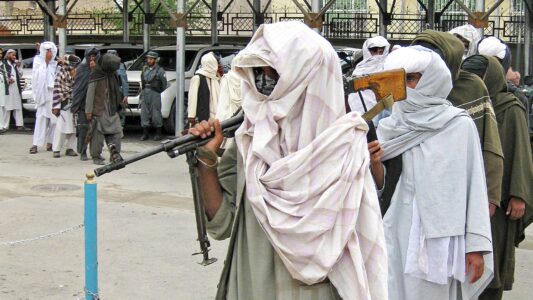
Why the Kabul airport bombers think the Taliban terrorists are too moderate
On Thursday night two bombs exploded just outside Kabul airport, killing at least 170 people, including 13 US service personnel. One bomb went off at the Abbey Gate entrance, where thousands were queuing to be evacuated.
Responsibility for the two twin explosions at Kabul airport on Thursday, 26 August, has been claimed by an organisation called ISIS-Khorasan.
ISIS – which is also known as Daesh – was founded in Syria and Iraq and carved out a huge swathe of territory which it described as a caliphate before it was defeated militarily by the Syrian government, Iraqi troops and Kurdish militiamen.
ISIS, or ISIL, stands for Islamic State In Iraq and the Levant (ad-Dawlah al-Islāmiyah fī ‘l-ʿIrāq wa-sh-Shām) and Khorasan is a reference to an ancient province of north-east Persia which included much of what is now Afghanistan.
Khorasan – which also included parts of what is today Turkmenistan and Iran – was home to a number of prominent Muslim scholars and theologians, including Imam Bukhari and Abu Dawood.
It is understood that in 2014 a number of disillusioned members split from the Taliban, swore allegiance to Daesh leader Abu Bakr al-Baghdadi and formed ISIS-Khorasan, sometimes referred to as ISIS-K.
The Taliban has always been allied to al-Qaeda – whose leader Osama Bin Laden it sheltered until the US-led invasion in 2001 – and regards ISIS/Daesh with disdain and ill-disguised contempt.
The leaders of ISIS-K reportedly believe the Taliban are too moderate and should have never agreed to allow the US and Britain to keep troops in Afghanistan until 31 August nor to evacuate their nationals and thousands of Afghans who fear the Taliban.
The United Nations estimated that there are between 500 and 1,200 ISIS-K fighters in Afghanistan, mainly in the northern provinces of Nuristan, Kunar and Nangarhar.
ISIS-K has been responsible for around 100 attacks in Afghanistan in the past year and has carried out massacres in mosques, public squares and even hospitals.
It is unclear what will happen when US and British troops finally leave Afghanistan next week.
ISIS-K is not powerful or popular enough to challenge Taliban rule and is unlikely to have any western targets left in Afghanistan after the withdrawal.
The fear is that they will move en masse, perhaps northwards into Turkmenistan where they might threaten the government of President Gurbanguly Berdymukhamedov.
Source: Sputnik News





